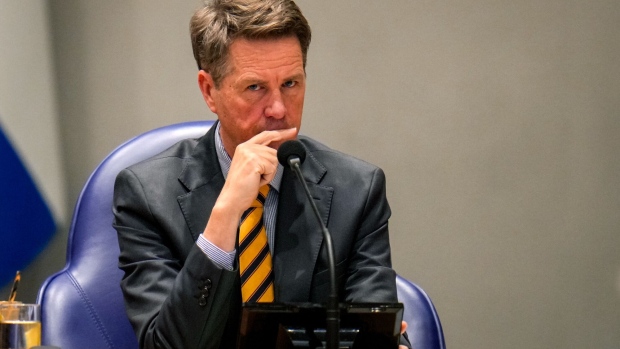Jun 26, 2024
Dutch House Speaker Disinvited From Slavery Remembrance Event
, Bloomberg News

(Bloomberg) -- Organizers of an annual commemoration of the abolition of slavery in the Netherlands withdrew an invitation to the chair of the Dutch Parliament, Martin Bosma, over his far-right views, highlighting how tensions remain high in the country after the electoral victory of the party led by Geert Wilders.
The slavery commemoration committee pulled the invite after a conversation between Bosma and the group’s chair, Linda Nooitgedacht, Bosma’s spokesperson said on Wednesday.
Anti-racism groups had been demanding the withdrawal of the invitation, customarily sent to the chair of the parliament to lay a wreath at the July 1 ceremony. Bosma is known for his “racist ideology and his insulting statements against Afro-Caribbean Dutch people,” the organizations wrote in a protest letter sent last week.
The outrage against Bosma’s views lays bare a divide growing between the progressive cornerstones of the Netherlands and the views of the far-right politicians who are taking up positions in the new Dutch government.
Keti Koti is the celebration of the abolition of slavery in Suriname and the Caribbean, former Dutch colonies. Prime Minister Mark Rutte apologized to the descendants of enslaved people for the past actions of the state, setting up a €200 million ($214 million) apology fund to raise awareness about slavery in 2022. The central bank and the king of the Netherlands have also apologized for the Dutch role in the slave trade in the past two years.
A loyal ally of Wilders and long-serving lawmaker of the Freedom Party, Bosma had been opposed to apologizing for Netherlands’ history of slavery. It is part of a “woke ideology that prevails in the arts, museums, the universities,” Bosma said prior to taking on the position of parliament chair in December. His appointment marked the first political appointment for Wilders’ Freedom Party after it secured the most seats in the November election.
“The commemoration should not be about me, but about the history of slavery,” Bosma said in a statement on Wednesday.
Wilders’ Freedom party, which forged alliances with right-leaning parties to agree on a cabinet this month, has always been a critic of last year’s slavery apology. Known for his outspoken stance against Islam and migration, Wilders this month nominated two candidates to the Dutch cabinet with a history of controversial views.
Wilders proposed Reinette Klever, founder of far-right TV channel Ongehoord Nederland known for its pro-Russian reporting and climate change skepticism, as minister of foreign trade and development aid. Marjolein Faber, a Freedom party lawmaker who has been proposed to head the newly-created ministry of asylum and migration, previously spoke of “repopulation,” a far-right theory that claims that white people are being replaced by non-white immigrants.
The day after the slavery memorial, on July 2, the new Dutch government will be sworn in. It won’t be Wilders but but former spy chief Dick Schoof who will take the prime minister post. He was tapped for the role after Wilders had to concede to his coalition partners that he wouldn’t enter the cabinet. Rutte, the incoming secretary general of NATO, will attend his last EU summit as acting prime minister this week.
©2024 Bloomberg L.P.


